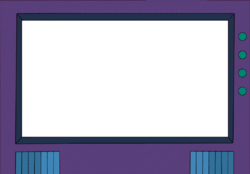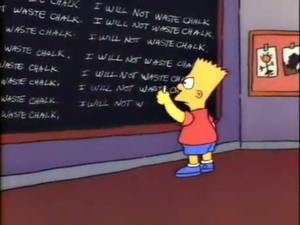
Wikisimpsons:Style Guide Episodes
| Style Guide: Episodes | |||||||||
The following is a style guide on how to create a high quality episode page, and is part of our Manual of Style. AimsThis style guide aims to help you write articles on all episodes of The Simpsons. Structure of an articleMain TabEvery article should be tabbed. This is done by putting Before both the infobox and the main page, be sure to add InfoboxThe For all but the upcoming episodes an appropriate image should be used, be it a promo or screenshot. All fields should be filled in where possible, though episodes missing certain opening gags and guest stars obviously can't be completed. ContentThe introductory line is a standard format, featuring the episode's position within the season (e.g. "the tenth episode of season 23"), the airdate and the guest stars and their roles. The article should have both a "Synopsis", a short summary, and a full "Plot". Links to other articles should be included on their first mention in the section. "Production" and "Reception" sections can also be added. In other languagesUse {{LanguageBox
|fr=yes
|frName=Noël mortel
|frTrans=Deadly Christmas
|qu=yes
|quName=Homer au nez rouge
|quTrans=Homer red nose
|de=yes
|deName=Es weihnachtet schwer
|deTrans=Christmas is Hard
|es=yes
|esName=Sin blanca Navidad
|esTrans=No white Christmas
|la=yes
|laName=Especial de Navidad de los Simpson
|laTrans=The Simpsons Christmas Special
|it=yes
|itName=Un Natale da cani
|itTrans=A Christmas dog
|br=yes
|brName=O prêmio de Natal
|brTrans=The Christmas prize
|hu=yes
|huName=Simpsonék karácsonya
|huTrans=The Simpsons' Christmas
}}
Somewhere near the end of the article Each episode page should have a season navbox at the bottom of each tab. For example, for an episode in season 7, this is done by putting The relevant year category should be added. Other optional categories are based around themes and center characters, for example Category:Environment-themed episodes and Category:Bart episodes. For a full list of these see Category:Episode themes and Category:Character centric episodes. References tabLike the main page, the tab should be used here, with There are four "set pieces" on the reference tab:
These should be presented in this order. If using one of the four, please add the relevant category. Like the standard tab, the relevant season template should be added, with an "R" on the end, e.g. Appearances tabStart the page with Then split appearances into the following sections:
All images should be in galleries in alphabetical order. For articles missing images, use File:No image.png, while mentioned characters/locations/objects should use File:Blank.png. Appearances that are incomplete should use End the page with the season navbox, for example Credits tabStart with {{tabC}} then In general, each credit is presented as follows: '''Job role''' [[Name]] '''Job role''' [[Name]] The most important thing to gather from this is the spacing. Between the job and the name, there should be one blank line, to avoid them ending up on the same line. Between name and the next job role, there should be two blank lines to better space it out. For job roles with multiple names, only one space is needed between them. However, where the names are credited separately, i.e. in the opening credits, and the starring and guest starring sections, these should each be credited as seen. Examples can be seen below. Multiple names on one screen, e.g. Animators: '''Animator''' [[Name1]] [[Name2]] [[Name3]] Multiple names on multiple screens, e.g. Produced by: '''Produced by''' [[Name1]] '''Produced by''' [[Name2]] '''Produced by''' [[Name3]] & [[Name4]] Starring (note the double lines): '''Starring''' [[Name1]] [[Name2]] [[Name3]] As with the other tabs, end with the relevant navbox, e.g. Quotes tabStart with The following are the main conventions you should use:
Example
GagsThe newest of the tabs gag pages use the As not every episode has gags, careful use of At the end of the page, be sure to add the season navbox, for example Title screen gagGenerally for HD episodes only, though there are exceptions like "The Simpsons 138th Episode Spectacular". The section should use the following formatting: <center> <gallery> File:image.png </gallery> '''Description''' </center> A note subsection may also be added, noting if it was repeated from another episode or was later reused. Billboard gagAgain for HD episodes, and again uses a similar formatting. <center> <gallery> File:image.png </gallery> '''Description''' </center> The description here should take note of both the text and the image on the billboard to create a full picture of the gag. Chalkboard gagThe chalkboard gag requires the use of the template{{Chalkboard}}, which has two fields - one for the image, one for the text. An example is {{Chalkboard|Bart the Genius (Chalkboard gag).png|I will not waste chalk}} which produces
Couch gagThe couch gag section starts with the infobox After this a description is used, which should be in bold and indented (use a ":" before the writing) Subsections here are the optional "Gallery", which features other images from the couch gag, "Appearances", which should follow the format of the "Appearances" tab, and if necessary a note section, which will useally feature something along the lines of "This couch gag was reused in "episode"." or "This couch gag was originally seen in "episode"." Other
|
|||||||||


